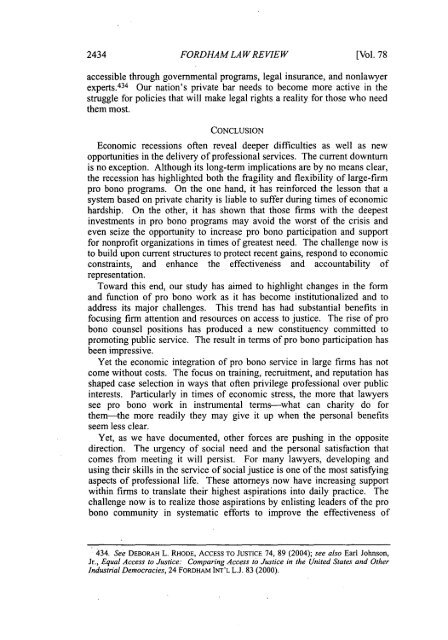Law for The Poor
Law for The Poor
Law for The Poor
You also want an ePaper? Increase the reach of your titles
YUMPU automatically turns print PDFs into web optimized ePapers that Google loves.
2434 FORDHAM LAW REVIEW<br />
[Vol. 78<br />
accessible through governmental programs, legal insurance, and nonlawyer<br />
experts. 434 Our nation's private bar needs to become more active in the<br />
struggle <strong>for</strong> policies that will make legal rights a reality <strong>for</strong> those who need<br />
them most.<br />
CONCLUSION<br />
Economic recessions often reveal deeper difficulties as well as new<br />
opportunities in the delivery of professional services. <strong>The</strong> current downturn<br />
is no exception. Although its long-term implications are by no means clear,<br />
the recession has highlighted both the fragility and flexibility of large-firm<br />
pro bono programs. On the one hand, it has rein<strong>for</strong>ced the lesson that a<br />
system based on private charity is liable to suffer during times of economic<br />
hardship. On the other, it has shown that those firms with the deepest<br />
investments in pro bono programs may avoid the worst of the crisis and<br />
even seize the opportunity to increase pro bono participation and support<br />
<strong>for</strong> nonprofit organizations in times of greatest need. <strong>The</strong> challenge now is<br />
to build upon current structures to protect recent gains, respond to economic<br />
constraints, and enhance the effectiveness and accountability of<br />
representation.<br />
Toward this end, our study has aimed to highlight changes in the <strong>for</strong>m<br />
and function of pro bono work as it has become institutionalized and to<br />
address its major challenges. This trend has had substantial benefits in<br />
focusing firm attention and resources on access to justice. <strong>The</strong> rise of pro<br />
bono counsel positions has produced a new constituency committed to<br />
promoting public service. <strong>The</strong> result in terms of pro bono participation has<br />
been impressive.<br />
Yet the economic integration of pro bono service in large firms has not<br />
come without costs. <strong>The</strong> focus on training, recruitment, and reputation has<br />
shaped case selection in ways that often privilege professional over public<br />
interests. Particularly in times of economic stress, the more that lawyers<br />
see pro bono work in instrumental terms-what can charity do <strong>for</strong><br />
them--the more readily they may give it up when the personal benefits<br />
seem less clear.<br />
Yet, as we have documented, other <strong>for</strong>ces are pushing in the opposite<br />
direction. <strong>The</strong> urgency of social need and the personal satisfaction that<br />
comes from meeting it will persist. For many lawyers, developing and<br />
using their skills in the service of social justice is one of the most satisfying<br />
aspects of professional life. <strong>The</strong>se attorneys now have increasing support<br />
within firms to translate their highest aspirations into daily practice. <strong>The</strong><br />
challenge now is to realize those aspirations by enlisting leaders of the pro<br />
bono community in systematic ef<strong>for</strong>ts to improve the effectiveness of<br />
434. See DEBORAH L. RHODE, ACCESS TO JUSTICE 74, 89 (2004); see also Earl Johnson,<br />
Jr., Equal Access to Justice: Comparing Access to Justice in the United States and Other<br />
Industrial Democracies, 24 FORDHAM INT'L L.J. 83 (2000).

















